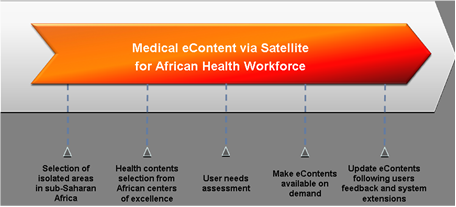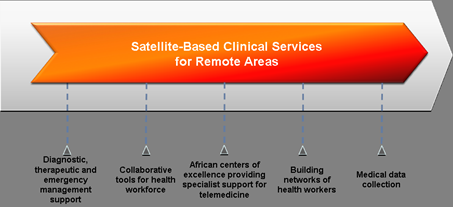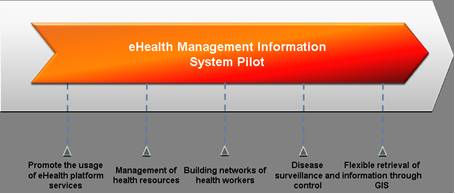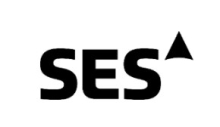
Objectives of the service
The objective of this demonstration project is to support the extension of health services in Africa through the use of satellite based technology in complement of other forms of Information and Communication Technologies.
In order to achieve this general objective, three intermediate objectives have been defined as follows:
- First Objective: Medical eContent via Satellite for African Health Workforce
- Second Objective: Satellite-Based Clinical Services for Remote Areas
- Third Objective: eHealth Management Information System Pilot
The main strength of the SAHEL initiative is that it includes the complete value chain of actors from medical staff and contacts on the ground, to medical experts in Africa and technical partners in charge of the satcom based interconnectivity services.
Figure 1: The 3 objectives of the SAHEL project.
Users and their needs
SAHEL end-users can be classified in three groups:
- Medical staff: doctors, nurses, mid-wives clinical officers, and community health workers at hospitals, medical centres and remote healthcare facilities that will use eLearning and eHealth services.
- Medical students at medical universities that will use eLearning services.
- NGOs staff and local population for which the Internet connection can be made available in less busy periods.
Additionally medical experts from reference centers of excellence can provide their advice and their training through the SAHEL platform.
Service/ system concept
The technical solution to be introduced includes three types of e-health services:
- medical e-Learning: to provide continuous training for healthcare professionals in rural settings.
- clinical e-Services: to link dispensaries and treatment centres to medical centres of excellence that can provide assistance for diagnostics and the treatment of patients.
- computerised health management system: to manage patients' files and collect medical data to monitor epidemics (such as AIDS in Kenya and malaria in Senegal).
Telemedicine is a burning issue and many separate initiatives are taking place. However, none of these initiatives takes as much care as SAHEL does in accomplishing the real needs of the end-users while at the same time proposing a complete and integrated platform.
Space Added Value
Satellite communications can fill the gaps in terrestrial networks by providing access to remote areas. They can contribute to bridge the "digital divide" and support countries to further develop their health system by improving access, quality and efficiency with the deployment of a light infrastructure of global coverage. Therefore, telemedicine via satellite can ensure equal access to medical expertise and irrespective of the geographical location. To do so, satellite-based broadband (fixed & mobile) is the most suitable way to deliver a host of eHealth services to remote areas as it is fast, efficient, reliable and cost-effective.
Current Status
The project has accomplished the first phase of the program devoted to the gathering and analysis of the user needs regarding the eHealth solutions in the Sub-Saharan region. In particular, the two pilot countries (Kenya and Senegal) have been taken as examples of the current situation in East and West Africa.
The user requirements were collected through an extensive survey carried out during the months of May and June. In Senegal more than 150 questionnaires were collected and in Kenya 453 health professionals and 80 Community Health Workers were interviewed. Medical staff from different health facilities across the country participated in the survey as well as medical experts in the capital. The result of this study have been reported in two project documents whose the Executive Summaries will be available for downloading from this website.
The activity was closed with the organisation of two public workshops (Dakar 10th October and Nairobi 17th October) organised and hosted by the project's African partners - Kinkeliba and AMREF. The objective was to present the survey result to the end users and to the authorities. By this mean, the SAHEL initiative insists on the importance of ensuring a user-driven approach integrated within the national Health strategies. The workshops were a success in terms of attendance and of the enriching exchanges between the SAHEL partners and the audience. In particular, more than 50 participants attended the events including health workers (nurses, midwives, and doctors), senior representatives from the Ministries of Health and Communications, medical university professors and relevant actors in the emerging eHealth sector in Africa.
The SAHEL project is entering now its more engineering-centred phase devoted to the tailoring of the SAHEL platform for the three services (medical eLearning, Clinical Services and eHMIS) to the expressed user needs.
Prime Contractor(s)
Subcontractor(s)









